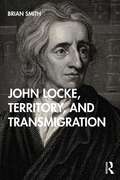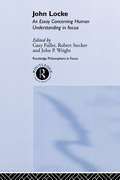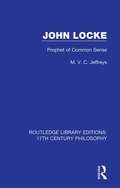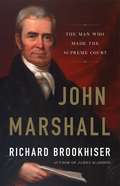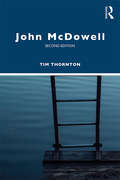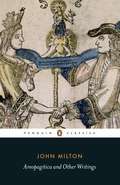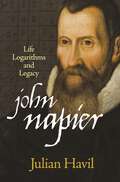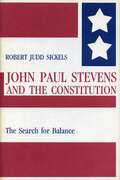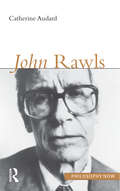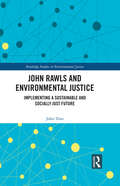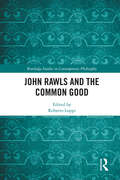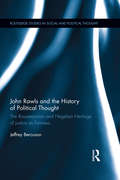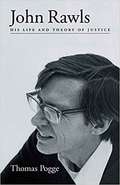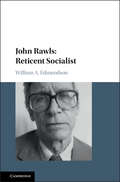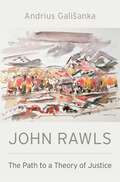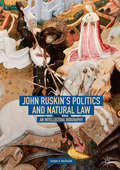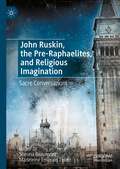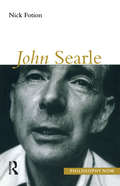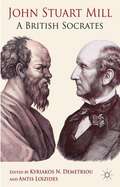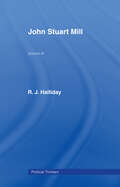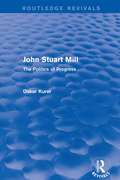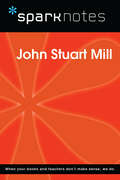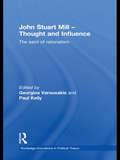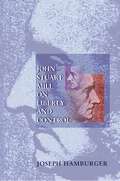- Table View
- List View
John Locke, Territory, and Transmigration
by Brian SmithThis book examines John Locke as a theorist of migration, immigration, and the movement of peoples. It outlines the contours of the public discourse surrounding migration in the seventeenth century and situates Locke’s in-depth involvement in these debates. The volume presents a variety of undercurrents in Locke’s writing — his ideas on populationism, naturalization, colonization and the right to withdrawal, the plight of refugees, and territorial rights — which have great import in present-day debates about migration. Departing from the popular extant literature that sees Locke advocating for a strong right to exclude foreigners, the author proposes a Lockean theory of immigration that recognizes the fundamental right to emigrate, thus catering to an age wrought with terrorism, xenophobia and economic inequality. A unique and compelling contribution, the volume will be of great interest to scholars and researchers of political theory, political philosophy, history of international politics, international relations, international political economy, public policy, seventeenth century English history, migration and citizenship studies, and moral philosophy.
John Locke: A Biography
by Maurice CranstonThis is a biography of John Locke who died in 1704. The author has written the biography based on Lovelace Collection as principal source which contained nearly three thousand letters and about a thousand miscellaneous manuscripts. These include accounts, which, because Locke was always careful with money, are unusually detailed; library lists; notebooks containing entries on philosophy, politics, literature, science, theology, economics and colonial administration; several more elaborate manuscripts on the same subjects; recipes, inventories, certificates of various kinds, and ten volumes of Locke's journal.
John Locke: En Essay Concerning Human Understanding in Focus
by Gary Fuller, Robert Stecker and John P. WrightJohn Locke's Essay Concerning Human Understanding is among the most important books in philosophy ever written. It is also a difficult work dealing with many themes, including the origin of ideas; the extent and limits of human knowledge; the philosophy of perception; and religion and morality. This volume is original in that it focuses on the last two of these topics and provides a clear and insightful survey of these overlooked aspects of Locke's best known work. Four eminent Locke scholars present authoritative discussions of Locke's view on the ethics of belief, personal identity, free will and moral theory. Contributors include John Passmore (Australian National University), Harold Noonan (Birmingham University), Vere Chappell (University of Massachusetts, Amherst), and Daniel Flage (James Madison University).
John Locke: Prophet of Common Sense (Routledge Library Editions: 17th Century Philosophy)
by M. V. JeffreysOriginally published in 1967. Locke's views in the field of education had great influence in the UK and abroad; and the aim of this book is to present them in the context of his general philosophical thinking, since it was mainly as a philosopher that Locke won his place in history. Because Locke was at the same time very much a man of affairs, and an interesting character on his own merits, the book gives a fairly full account of his life and times. Some attention is paid to his relations with the brilliant political adventurer, Lord Shaftesbury, without whom Locke's own career would have been very different, and might not have offered the opportunities which led to his writings on education. The book seeks to emphasize the importance of Locke's empirical approach to truth - the method of modern science, without which the modern study of education, and the science of psychology in particular, would never have developed.
John Marshall: The Man Who Made the Supreme Court
by Richard BrookhiserThe life of John Marshall, Founding Father and America's premier chief justice In 1801, a genial and brilliant Revolutionary War veteran and politician became the fourth chief justice of the United States. He would hold the post for 34 years (still a record), expounding the Constitution he loved. Before he joined the Supreme Court, it was the weakling of the federal government, lacking in dignity and clout. After he died, it could never be ignored again. Through three decades of dramatic cases involving businessmen, scoundrels, Native Americans, and slaves, Marshall defended the federal government against unruly states, established the Supreme Court's right to rebuke Congress or the president, and unleashed the power of American commerce. For better and for worse, he made the Supreme Court a pillar of American life. In John Marshall, award-winning biographer Richard Brookhiser vividly chronicles America's greatest judge and the world he made.
John McDowell
by Tim ThorntonJohn McDowell is one of the most widely read philosophers in recent years. His engagement with a philosophy of language, mind and ethics and with philosophers ranging from Aristotle and Wittgenstein to Hegel and Gadamer make him one of the most original and outstanding philosophical thinkers of the post-war period. In this clear and engaging book, Tim Thornton introduces and examines the full range of McDowell's thought. After a helpful introduction setting out McDowell's general view of philosophy, Thornton introduces and explains the following topics: Wittgenstein on philosophy, normativity and understanding; value judgements; theories of meaning and sense; singular thought and Cartesianism; perceptual experience and knowledge, disjunctivism and openness to the world; Mind and World, the content of perceptual experience and idealism; action and the debate with Hubert Dreyfus on conceptual content and skilled coping. This second edition has been significantly revised and expanded to include new sections on: McDowell's work on disjunctivism and criticisms of it; a new chapter on McDowell's modification of his account of perceptual experience and conceptual content, and criticisms by Charles Travis; and a new chapter on action and McDowell's engagement with Hubert Dreyfus and the debate concerning skilled coping and mindedness. The addition of a glossary and suggestions for further reading makes John McDowell, second edition essential reading for those studying McDowell, philosophy of language, philosophy of mind, ethics and epistemology, as well as for students of the recent history of analytical philosophy generally.
John Milton: Areopagitica and Other Writings
by John Milton William PooleJohn Milton was celebrated and denounced in his own time both as a poet and as a polemicist. Today he is remembered first and foremost for his poetry, but his great epic Paradise Lost was published very late in his life, in 1667, and in his own time most readers more readily recognized Milton as a writer of prose. This superbly annotated new book is an authoritative edition of Milton’s major prose works, including Of Education, The Tenure of Kings and Magistrates, and the Divorce tracts, as well as the famous 1644 polemical tract opposing licensing and censorship, Areopagitica. For more than sixty-five years, Penguin has been the leading publisher of classic literature in the English-speaking world. With more than 1,500 titles, Penguin Classics represents a global bookshelf of the best works throughout history and across genres and disciplines. Readers trust the series to provide authoritative texts enhanced by introductions and notes by distinguished scholars and contemporary authors, as well as up-to-date translations by award-winning translators.
John Napier: Life, Logarithms, and Legacy
by Julian HavilThe most comprehensive account of the mathematician's life and workJohn Napier (1550–1617) is celebrated today as the man who invented logarithms—an enormous intellectual achievement that would soon lead to the development of their mechanical equivalent in the slide rule: the two would serve humanity as the principal means of calculation until the mid-1970s. Yet, despite Napier's pioneering efforts, his life and work have not attracted detailed modern scrutiny. John Napier is the first contemporary biography to take an in-depth look at the multiple facets of Napier’s story: his privileged position as the eighth Laird of Merchiston and the son of influential Scottish landowners; his reputation as a magician who dabbled in alchemy; his interest in agriculture; his involvement with a notorious outlaw; his staunch anti-Catholic beliefs; his interactions with such peers as Henry Briggs, Johannes Kepler, and Tycho Brahe; and, most notably, his estimable mathematical legacy.Julian Havil explores Napier’s original development of logarithms, the motivations for his approach, and the reasons behind certain adjustments to them. Napier’s inventive mathematical ideas also include formulas for solving spherical triangles, "Napier’s Bones" (a more basic but extremely popular alternative device for calculation), and the use of decimal notation for fractions and binary arithmetic. Havil also considers Napier’s study of the Book of Revelation, which led to his prediction of the Apocalypse in his first book, A Plaine Discovery of the Whole Revelation of St. John—the work for which Napier believed he would be most remembered.John Napier assesses one man’s life and the lasting influence of his advancements on the mathematical sciences and beyond.
John Paul Stevens and the Constitution: The Search for Balance
by Robert SickelsA good pragmatist's constitutional theory is inseparable from the legal disputes out of which it arises. John Paul Stevens's theory, that of deciding individual cases well instead of applying constitutional principles in the abstract to cases by category, thus lends itself to being studied in its natural, factual habitat—in his own words, case by case. That's what this book does. In Chapter 1 Sickels distills Stevens's thoughts about law and appellate judging from his early writings and his opinions on the federal appeals court and, from 1975 to the present, on the U.S. Supreme Court. Stevens shows a concern for facts and consequences, for balancing, for deference to other decision makers unless they have been careless, for avoidance of undue complexity in judge-made law, and for drawing the line between clarity and oversimplification in legal rules. The next three chapters describe the application of Stevens's pragmatism to areas of constitutional law to which the Court and he especially have devoted most attention in recent years: First Amendment guarantees of freedom of expression and religion, the procedural guarantees (broadly, due process) of the Bill of Rights and the Fourteenth Amendment, and the equal protection of the laws. In each area, Stevens's special contributions are described. The concluding chapter places Stevens's judging in the contexts of the ongoing debate about the legitimacy of balancing, the ways of other moderates on the Court, and the voting records of the other members of the Court as a whole.Unique to this work is a meaningful introduction to the term moderate when applied to a Supreme Court justice, a definition based on careful analysis of the interplay of general rules and specific, case-by-case context. As such it is the very essence of Stevens's own way of judging and thus enables analysis of the work of a pragmatist on his own terms rather than through the distortions of a conflicting theory of law. John Paul Stevens is recognized as a jurist of unusual ability and one adheres to no ideological camp. While it is one thing to know he is neither rigid liberal nor a conservative, this book goes beyond the "neither nor" to accomplish the more difficult goal of defining what he is.This study is intended for scholars and students of the Supreme Court, the Constitution, the courts, and the American political process. Lawyers working before the Supreme Court, informed generalists, and courtwatchers generally, whether liberal, conservative, or neutral, will find much of interest here.
John Rawls (Philosophy Now #10)
by Catherine AudardJohn Rawls (1921-2002) is one of the most influential thinkers of the twentieth century. Contemporary political philosophy has been reshaped by his seminal ideas and most current work in the discipline is a response to them. This book introduces his central ideas and examines their contribution to contemporary political thought. In the first part of the book Catherine Audard focuses on Rawls' conception of political and social justice and its justification as presented in his groundbreaking A Theory of Justice. This includes sustained examination of Rawls' moral philosophy and its core thesis, the primacy of justice, the complex relation between Rawls' views and utilitarianism, and his most famous concept, the Original Position Device. In the second half of the book, Audard explores Rawls' more practical concerns for stability and political consensus, citizenship and international justice, and shows the continuity between these concerns and his earlier work. Throughout, Audard contextualizes Rawls' ideas by giving a sense of their historical development, which underlines the intellectual cohesion of his thought. The move between ethics and politics so characteristic of Rawls' work, and which makes for the richness of his philosophy, is shown to also create for it significant problems. John Rawls combines clear exposition with insightful analysis and provides an interpretative and critical framework that will help shape ongoing debates surrounding Rawls' work.
John Rawls and Environmental Justice: Implementing a Sustainable and Socially Just Future (Routledge Studies in Environmental Justice)
by John TönsUsing the principles of John Rawls’ theory of justice, this book offers an alternative political vision, one which describes a mode of governance that will enable communities to implement a sustainable and socially just future. Rawls described a theory of justice that not only describes the sort of society in which anyone would like to live but that any society can create a society based on just institutions. While philosophers have demonstrated that Rawls’s theory can provide a framework for the discussion of questions of environmental justice, the problem for many philosophical theories is that discussions of sustainable development open the need to address questions of ecological interdependence, historical inequality in past resource use and the recognition that we cannot afford to ignore the limitations of growth. These ideas do not fit in comfortably in standard discourse about theories of justice. In contrast, this book frames the discussion of global justice in terms of environmental sustainability. The author argues that these ideas can be used to develop a coherent political theory that reconciles cosmopolitan arguments and the non-cosmopolitan or nationalist arguments concerning social and environmental justice. This book will be of great interest to students and scholars of environmental philosophy and ethics, moral and political philosophy, global studies and sustainable development.
John Rawls and the Common Good (Routledge Studies in Contemporary Philosophy)
by Roberto LuppiThe essays in this volume analyze the relationship between core concepts of the common good and the work of American political philosopher John Rawls.One of the main criticisms that has been made of Rawls is his supposed neglect of central aspects of collective life. The contributors to this book explore the possibility of a substantive and community-oriented interpretation of Rawls’s thought. The chapters investigate Rawls’s views on values such as community, faith, fraternity, friendship, gender equality, love, political liberty, reciprocity, respect, sense of justice, and virtue. They demonstrate that Rawls finds a balance between certain individualistic aspects of his theory of justice and the value of community. In doing so, the book offers insightful new readings of Rawls.John Rawls and the Common Good will be of interest to scholars and advanced students working in political, moral, and legal philosophy.
John Rawls and the History of Political Thought: The Rousseauvian and Hegelian Heritage of Justice as Fairness (Routledge Studies in Social and Political Thought)
by Jeffrey BercusonIn this book, Jeffrey Bercuson presents the immense, and yet for the most part unrecognized, influences of Jean-Jacques Rousseau and Georg Wilhelm Friedrich Hegel on John Rawls, the most important political philosopher of the 20th century. While the well-documented influence of Immanuel Kant on Rawls is deep and profound, Kantian features and interpretation of justice as fairness do not tell the whole story about that doctrine. Drawing on Rawls’s Lectures on the History of Moral Philosophy and his Lectures on the History of Political Philosophy, Bercuson presents the reader with a more nuanced, accurate account of the moral and political philosophy of Rawls in light of these under-appreciated influences. This new, richer image of Rawls’s political philosophy shows that Rawls’s notion of reasonableness – his notion of the kind and extent of our obligations to those fellows with whom we are engaged in social cooperation – is conspicuously more demanding, and therefore more attractive, than most interpreters and critics assume. Rawls turns to Rousseau and to Hegel, both of whom provide attractive images of engaged citizenship worthy of emulation. Written accessibly, and contributing to key contemporary debates of global justice, this book will be read by scholars within the fields of social and political theory, ethics, and philosophy.
John Rawls: His Life And Theory Of Justice
by Thomas Pogge Michelle KoschJohn Rawls was one of the most important political philosophers of our time, and promises to be an enduring figure over the coming decades. His Theory of Justice (1971) has had a profound impact across philosophy, politics, law, and economics. Nonetheless Rawlsian theory is not easy to understand, particularly for beginners, and his writing can be dense and forbidding. Thomas Pogge's short introduction (originally published in German) gives a thorough and concise presentation of the main outlines of Rawls's theory, introduces biographical information when necessary, and draws links between the Rawlsian enterprise and other important positions in moral and political philosophy.
John Rawls: Ideal Theory And Practical Demands
by William A. EdmundsonThis book is the first detailed reconstruction of the late work of John Rawls, who was perhaps the most influential philosopher of the twentieth century. Rawls's 1971 treatise, A Theory of Justice, stimulated an outpouring of commentary on 'justice-as-fairness,' his conception of justice for an ideal, self-contained, modern political society. Most of that commentary took Rawls to be defending welfare-state capitalism as found in Western Europe and the United States. Far less attention has been given to Rawls's 2001 book, Justice as Fairness: A Restatement. In the Restatement, Rawls not only substantially reformulates the 'original position' argument for the two principles of justice-as-fairness but also repudiates capitalist regimes as possible embodiments. Edmundson further develops Rawls's non-ideal theory, which guides us when we find ourselves in a society that falls well short of justice.
John Rawls: The Path to a Theory of Justice
by Andrius GališankaCritics have maintained that John Rawls’s theory of justice is unrealistic and undemocratic. Andrius Gališanka’s incisive intellectual biography argues that in misunderstanding the origins and development of Rawls’s argument, previous narratives fail to explain the novelty of his philosophical approach and so misunderstand his political vision.
John Ruskin's Politics and Natural Law: An Intellectual History
by Graham A. MacDonaldThis book offers new perspectives on the origins and development of John Ruskin’s political thought. Graham A. MacDonald traces the influence of late medieval and pre-Enlightenment thought in Ruskin’s writing, reintroducing readers to Ruskin’s politics as shaped through his engagement with concepts of natural law, legal rights, labour and welfare organization. From Ruskin’s youthful studies of geology and chemistry to his back-to-the-land project, the Guild of St. George, he emerges as a complex political thinker, a reformer—and what we would recognize today as an environmentalist. John Ruskin’s Politics and Natural Law is a nuanced reappraisal of neglected areas of Ruskin’s thought.
John Ruskin, the Pre-Raphaelites, and Religious Imagination: Sacre Conversazioni
by Sheona Beaumont Madeleine Emerald ThieleThis volume presents a collection of essays by leading experts which examine nineteenth century ideas about Christian theology, art, architecture, restoration, and curatorial practice. The volume unveils the importance of John Ruskin’s writing for today’s audience, and allies it with the dynamism of the Pre-Raphaelite religious imagination. Ruskin’s drawings and daguerreotypes, as well as Pre-Raphaelite paintings, stained glass, and engravings, are shown to be alive with visual theology: artists such as Dante Gabriel Rossetti, John Everett Millais, Edward Burne-Jones, and Evelyn de Morgan illuminate aspects of faith and aesthetics. The interdisciplinary nature of this volume encourages reflection upon praise, truth, and beauty. The aesthetic conversations between Ruskin and the Pre-Raphaelites themselves become a form of ‘sacra conversazione’.
John Searle (Philosophy Now Ser.)
by Nicholas FotionDirect, combative and wide-ranging, John Searle's philosophy has made fundamental and lasting contributions to thinking in language, mind, knowledge, truth and the nature of social reality. His account of language based on speech-acts, that mind is intentional, and the Chinese Room Argument, are just some of his most famous contributions to philosophical thinking. In this - the first introduction to John Searle's philosophy - Nick Fotion provides clear and assured exposition of Searles' ideas, while also testing and exploring their implications. The book begins by examining Searle's work on the philosophy of language: his analysis of speech acts such as promising, his taxonomy of speech acts and the wider range of indirect speech acts and metaphorical uses of language. The book then moves on to cover the philosophy of mind and outlines Searle's ideas on international states. It introduces his notions of 'background' and 'network', his claims for the often unrecognized importance of consciousness, and examines his attacks on other philosophical accounts of mind, such as materialism, functionalism and strong AI. The final section examines Searle's later work on the construction of social reality and concludes with more general reflections on Searle's position vis-a-vis ontology, epistemology, scepticism and the doctrine of 'external realism'.
John Stuart Mill
by Kyriakos N. Demetriou Antis LoizidesThis edited collection highlights the inquisitive and synthetic aspects of John Stuart Mill's mode of philosophising while exploring various aspects of Mill's thought, intellectual development and influence. The contributors to this volume discuss a number of Mill's ideas including those on political participation, democracy, liberty and justice.
John Stuart Mill
by R J Halliday R. J. HallidayFirst published in 1976, this volume offers a significant new interpretation of Mill's political thought, Mill's ambivalent attitude to democracy is carefully examined. The implications for modern democracy of Mill's views on consensus and leadership, bureaucracy and participation, equality and liberty emerge from a deep understanding of Mill's place in 19th century ideas.
John Stuart Mill (Routledge Revivals): The Politics of Progress
by Oskar KurerFirst published in 1991, this book attempts to deal with Mill’s thought as a coherent system and tie some elements of his thoughts together. It seeks to show that he developed a set of ethical principles to underlie government intervention and provide a theory as to how it should intervene — which he then applied to practical politics. The first chapters deal with Mill’s doctrine of improvement and what impact the improvement of man has on the social organisation of society. The third chapter deals with Mill’s theory of economic development. The second part of the book deals with policy issues such as the question of the optimal constitution and Mill’s policy proposals for England.
John Stuart Mill (SparkNotes Philosophy Guide)
by SparkNotesJohn Stuart Mill (SparkNotes Philosophy Guide) Making the reading experience fun! SparkNotes Philosophy Guides are one-stop guides to the great works of philosophy–masterpieces that stand at the foundations of Western thought. Inside each Philosophy Guide you&’ll find insightful overviews of great philosophical works of the Western world.
John Stuart Mill - Thought and Influence: The Saint of Rationalism (Routledge Innovations in Political Theory)
by Georgios VarouxakisMore than two hundred years after his birth, and 150 years after the publication of his most famous essay On Liberty, John Stuart Mill remains one of the towering intellectual figures of the Western tradition. This book combines an up-to-date assessment of the philosophical legacy of Mill’s arguments, his complex version of liberalism and his account of the relationship between character and ethical and political commitment. Bringing together key international and interdisciplinary scholars, including Martha Nussbaum and Peter Singer, this book combines the latest insights of Mill scholarship with a long-term appraisal of the ways in which Mill’s work has been received and interpreted from the time of his death in 1873 to today. The book offers compelling insights into Mill’s posthumous fate and reputation; his youthful political and intellectual activism; his views on the formation of character; the development of his thought on logic; his differences from his father and Bentham; his astonishingly prescient, environmentally sensitive and ‘green’ thought; his relation to virtue ethics; his conception of higher pleasures and its relation to his understanding of justice; his feminist thought and its place in contemporary debates and feminist discourses; his defence of free speech and its fundamental significance for his liberalism; and his continued contemporary relevance on a number of major issues. This book will be of interest to students and scholars of Politics, Political Theory, Philosophy, History, English, Psychology, and also Cultural Studies, Empire studies, nationalism and ethnicity studies.
John Stuart Mill on Liberty and Control
by Joseph HamburgerJohn Stuart Mill is one of the hallowed figures of the liberal tradition, revered for his defense of liberal principles and expansive personal liberty. By examining Mill's arguments in On Liberty in light of his other writings, however, Joseph Hamburger reveals a Mill very different from the "saint of rationalism" so central to liberal thought. He shows that Mill, far from being an advocate of a maximum degree of liberty, was an advocate of liberty and control--indeed a degree of control ultimately incompatible with liberal ideals. Hamburger offers this powerful challenge to conventional scholarship by presenting Mill's views on liberty in the context of his ideas about, in particular, religion and historical development. The book draws on the whole range of Mill's philosophical writings and on his correspondence with, among others, Harriet Taylor Mill, Auguste Comte, and Alexander Bain to show that Mill's underlying goal was to replace the traditional religious basis of society with a form of secular religion that would rest on moral authority, individual restraint, and social control. Hamburger argues that Mill was not self-contradictory in thus championing both control and liberty. Rather, liberty and control worked together in Mill's thought as part of a balanced, coherent program of social and moral reform that was neither liberal nor authoritarian. Based on a lifetime's study of nineteenth-century political thought, this clearly written and forcefully argued book is a major reinterpretation of Mill's ideas and intellectual legacy.
